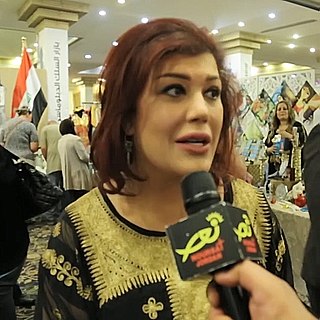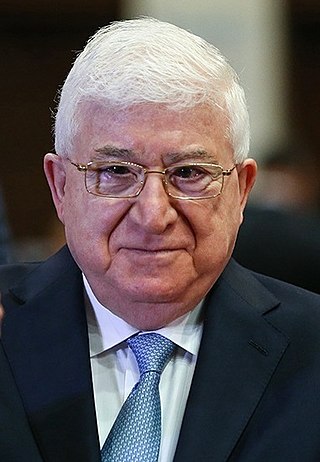Related Research Articles
Iraq is a federal parliamentary representative democratic republic. It is a multi-party system whereby the executive power is exercised by the Prime Minister of the Council of Ministers as the head of government, the President of Iraq as the head of state, and legislative power is vested in the Council of Representatives.

Ibrahim Abd al-Karim al-Eshaiker, also known as Ibrahim al-Jaafari, is an Iraqi politician who was Prime Minister of Iraq in the Iraqi Transitional Government from 2005 to 2006, following the January 2005 election. He served as Minister of Foreign Affairs from 2014 to 2018.

The Islamic Dawa Party, also known as the Islamic Call Party, is an Shia Islamist political party in Iraq. Dawa and the Supreme Islamic Iraqi Council are two of the main parties in the religious-Shiite United Iraqi Alliance, which won a plurality of seats in both the provisional January 2005 Iraqi election and the longer-term December 2005 election. The party is led by Haider al-Abadi, who was the Prime Minister of Iraq from 8 September 2014 to 25 October 2018. The party backed the Iranian Revolution and also Ayatollah Ruhollah Khomeini during the Iran–Iraq War and the group still receives financial support from Tehran despite ideological differences with the Islamic Republic.

Ayad Allawi is an Iraqi politician. He served as the vice president of Iraq from 2014 to 2015 and 2016 to 2018. Previously he was interim prime minister of Iraq from 2004 to 2005 and the president of the Governing Council of Iraq in 2003.

Haider Jawad Kadhim al-Abadi is an Iraqi politician who was Prime Minister of Iraq from September 2014 until October 2018. Previously he served as Minister of Communication from 2003 to 2004, in the first government after Saddam Hussein was deposed.
Hazim al-Shaalan al-Khuzaei was Iraq's Defence Minister from June 2004 until May 2005 under the Iraqi Interim Government of Ayad Allawi.

Saleh Muhammed al-Mutlaq is an Iraqi politician who is the head of the Iraqi Front for National Dialogue, the fifth largest political list in Iraq's parliament. From 21 December 2010 to 11 August 2015, he was one of the three deputy prime ministers of Iraq.

Nouri Kamil Muhammad-Hasan al-Maliki, also known as Jawad al-Maliki, is secretary-general of the Islamic Dawa Party and was the prime minister of Iraq from 2006 to 2014 and the vice president of Iraq from 2014 to 2015 and 2016 to 2018. Al-Maliki began his political career as a Shia dissident under Saddam Hussein's in the late 1970s and rose to prominence after he fled a death sentence into exile for 24 years. During his time abroad, he became a senior leader of the Islamic Dawa Party, coordinated the activities of anti-Saddam guerrillas and built relationships with Iranian and Syrian officials whose help he sought in overthrowing Saddam. Al-Maliki worked closely with United States and coalition forces in Iraq following their departure by the end of 2011.

Thamir Abbas Ghadhban is an Iraqi civil servant and politician.

Osama Abdul Aziz al-Nujaifi or Najifi is an Iraqi politician and served as one of the three vice presidents of the country, from 2014 to 2015 and 2016 to 2018. As the speaker of the Council of Representatives, the informal leader of the moderate Sunni al-Hadba party was the highest ranking Sunni politician of Iraq.

Safia Taleb Ali al-Suhail is an Iraqi Shi'aa Muslim politician who currently serves as an Ambassador of Iraq to Italy September 2020. She was appointed the first female ambassador of Iraq in Oman in 2004, and she held important political and diplomatic positions in the country, including: a member of the Iraqi parliament for two parliamentary sessions on the capital Baghdad in the period 2005-2014, and the head of the Europe Department in the Iraqi Ministry of Foreign Affairs from 2014-2016, and the ambassador of the Republic of Iraq. To the Hashemite Kingdom of Jordan in the period 2016-2019 ”, She was a former member of the Council of Representatives of Iraq who was elected in December 2005 for the secular Iraqi National List.
The Coalition for Iraqi National Unity (CINU) is a political party in Iraq. It is led by Nehru Mohammed Abdul Karim al-Kasanzani.
The Al Anbar governorate election of 2013 was held on 20 June 2013 alongside elections for Nineveh.

The General Military Council for Iraqi Revolutionaries abbreviated as GMCIR or MCIR, is a Ba'athist militant group active in Iraq headed by Saddam Hussein-era military and political leaders. It has been described by Al Jazeera as "one of the main groups" in the Iraqi insurgency.

Muhammad Fuad Masum is an Iraqi Kurdish politician who served as the seventh president of Iraq from 24 July 2014 to 2 October 2018. He was elected as president following the 2014 parliamentary election. Masum is the second non-Arab president of Iraq, succeeding Jalal Talabani, also Kurdish, and was a confidant of Talabani.

The departure of US troops from Iraq in 2011 ended the period of occupation that had begun with the U.S.-led invasion in March 2003. The time since U.S. withdrawal has been marked by a renewed Iraqi insurgency and by a spillover of the Syrian civil war into Iraq. By 2013, the insurgency escalated into a renewed war, the central government of Iraq being opposed by ISIL and various factions, primarily radical Sunni forces during the early phase of the conflict. The war ended in 2017 with an Iraqi government and allied victory, however ISIL continues a low-intensity insurgency in remote parts of the country.
Events in the year 2017 in Iraq.

Parliamentary elections were held in Iraq on 12 May 2018. The elections decided the 329 members of the Council of Representatives, the country's unicameral legislature, who in turn will elect the Iraqi President and Prime Minister. The Iraqi parliament ordered a manual recount of the results on 6 June 2018. On 10 June 2018, a storage site in Baghdad housing roughly half of the ballots from the May parliamentary election caught fire.
The Victory Alliance is a Muslim democratic Iraqi political alliance established by former Iraqi Prime Minister Haider al-Abadi.
The Sunni Endowment Office is an Iraqi administration created by the Iraqi Governing Council after the fall of Saddam Hussein in 2003. It was created from the dissolution of the Ministry of Awqaf and religious Affairs in former Baath rule, separating from it the religious endowments of Shi'ites and non-Islamic religions.
References
- 1 2 3 4 "Iraq issues arrest warrant for trade minister over corruption". al Araby. 2015-10-19. Retrieved 2018-12-01.
- 1 2 3 Wong, Edward (2005-08-21). "As Sunni Divisions Widen, Iraq's Sufis Are Under Attack". New York Times. Retrieved 2018-12-01.
- 1 2 "Iraq sentences former minister in absentia on graft charges". Saudigazette. 2018-11-29. Retrieved 2018-12-01.
- ↑ "Bulletin 281 - August 2008" (PDF). Institut kurde de Paris. 2008-08-01. Retrieved 2018-12-01.
- ↑ Woodward, Bob (2004). Plan of Attack. Simon & Schuster. p. 305.
- ↑ "U.S. strikes Fallujah; two troops killed". China Daily. 2004-12-13. Retrieved 2018-12-01.
- ↑ "What Are an Iraqi CIA Agent and His Novice Lobbyist Up to in Washingt…". DC Bureau. 2019-05-15. Archived from the original on 2013-04-16. Retrieved 2018-12-01.
- ↑ "Motlak says decision to exclude him from elections indicates "there is no state"". Aswat Al Iraq. 2011-07-11. Archived from the original on 2011-07-11. Retrieved 2018-12-01.
- ↑ "EIFA - A look at the new Iraqi Cabinet". 2016-03-04. Archived from the original on 2016-03-04. Retrieved 2018-12-01.
- ↑ "Iraq sentences ex-minister accused of embezzling $14.3m of public money". al Araby. 2018-11-29. Retrieved 2018-12-01.